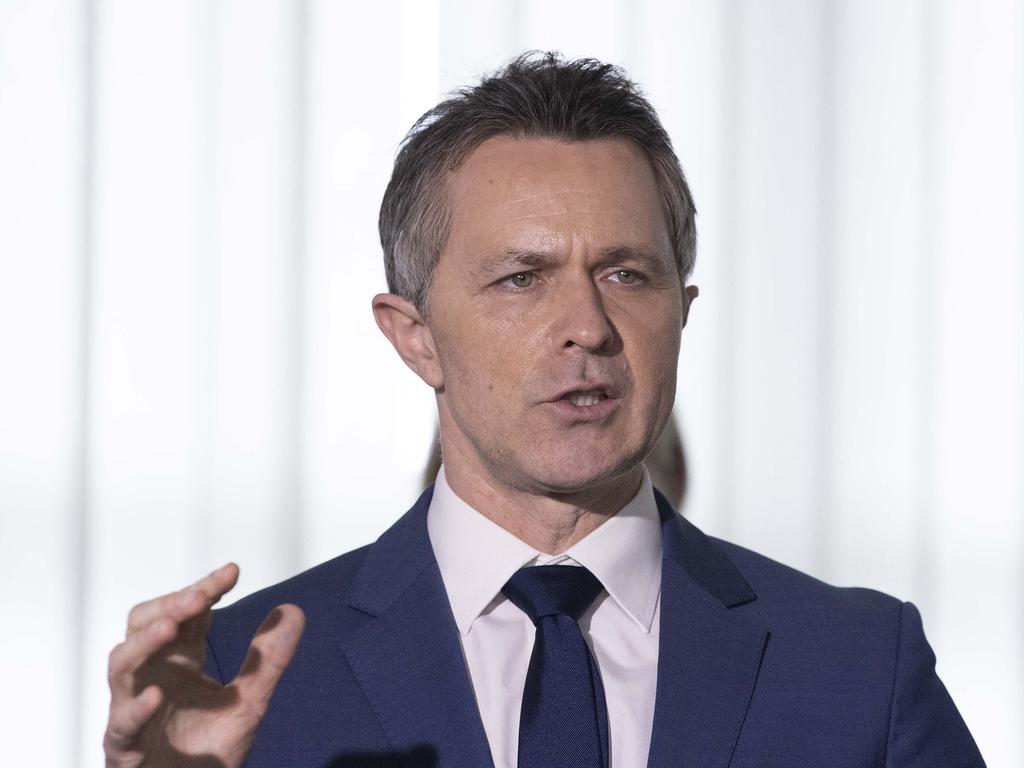Million ‘teen robots’ on path to illiteracy, OECD warns
Global education leader slams Australia’s shallow school curriculum for producing ‘second-class robots’ amid damning new data.

A global education leader has criticised Australia’s shallow school curriculum for producing “second-class robots’’, as damning new data reveals a million teenagers are on a track to illiteracy over the next five years.
Andreas Schleicher, education and skills director with the Organisation for Economic Co-operation and Development, has warned that Australia has “made learning often a mile wide, but just an inch deep’’.
“I would say that is one of the real challenges in Australia,’’ he says in a speech prepared for the National Catholic Education Conference next week.
“The challenge is to teach fewer things at greater depths.
“If you look at the top-performing education systems, that’s what they do. They often focus more on deep conceptual understanding rather than just surface content.’’
Mr Schleicher called for more rigour in the curriculum to teach children to think for themselves and collaborate, instead of educating “second-class robots, people who are good at repeating what we’ve told them’’.
“We have made students passive consumers of a lot of learning content,’’ he said.
Mr Schleicher oversees the world’s biggest comparative school test, the OECD’s Program for International Student Assessment (PISA), which has revealed a startling slide in achievement among Australian 15-year-olds compared to students from 75 other industrialised countries over the past decade. Since 2003, Australian students have dropped from 11th place in maths to 29th, from eighth place in science to 15th, and from fourth to 16th in literacy.
Criticism of the national curriculum – which was simplified and “decluttered” in April following a two-year review – coincides with warnings of alarmingly low literacy levels among students.
The most recent PISA test, involving 14,000 Australian students in 2018, found one in five teens reads at the lowest of seven levels of proficiency – a level the OECD regards as “too low to enable them to participate effectively and productively in life”. Only 60 per cent read at a “proficient standard’’ of level three.
Learning First chief executive Ben Jensen has extrapolated the data to calculate that 800,000 Australian students have substandard literacy levels. He predicts that will soar to a million by 2028, unless they are given help to catch up with reading and writing.
“Translated across the school system, that means a million students, out of just over four million, who cannot read well enough to have a productive career and a full life,’’ he writes in Inquirer on Saturday. “The evidence shows that when students who are behind are taught clearly identified and sequenced knowledge appropriate to their grade level, using high-quality instructional materials, they can accelerate … learning and make up huge ground.’’
Dr Jensen also criticised the new national curriculum, which the Australian Primary Principals Association has declared “impossible to teach”. He said Australia’s curriculum is “not high-quality and knowledge-rich’’.
“It does nothing to guarantee the knowledge students are supposed to learn,’’ he said.
“It fails to provide teachers with comprehensive, high-quality instructional materials.’’
The Australian Curriculum, Assessment and Reporting Authority, which released the new curriculum in April, has withheld the 2022 NAPLAN results until year’s end. Last year’s testing of a million children found one in five teenage boys is semiliterate, with one in 10 girls and one in five boys failing to reach the minimum standard for writing in Year 9.
Mr Schleicher, a physicist and statistician who studied in Australia for his masters in science from Deakin University, is special adviser on education policy to OECD secretary-general Mathias Cormann, Australia’s former finance minister and special minister of state. He said that in PISA’s reading literacy tests, “Australia has gone backwards’’.
“I’m not saying that Australian students learn less necessarily but when it comes to those advanced knowledge management skills, this is where they increasingly struggle,’’ he said.
Mr Schleicher said the curriculum must teach children to out-think robots, and “think for themselves and collaborate with others’’. He said top-performing education systems “look at the realm of human knowledge, the realm of ethics and judgment, the realm of political and civic life, the realm of creativity, aesthetics, design, of physical health, natural health, economic life’’.
“(They teach) those fundamental concepts that make us different from the artificial intelligence that we have created in our computers. Teaching fewer things at greater depths is really one of the key challenges.’’
Mr Schleicher said the most successful countries in education used “rigour, making sure that students are challenged in every moment of their learning’’.
“It’s about focus, teaching fewer things at greater depths.
“Success is about remaining true to the disciplines, helping students understand the ideas, the foundations of a discipline.’’
Mr Schleicher said China had leapt to the top of the education league tables by pairing high- and low-performing schools.
“If you’re a high-performing school you often get more resources, more money, but you use those resources to support a low-performing school so everybody benefits,’’ he said.
“The high-performing school gets more resources, more staff, prestige – the low-performing school gets the experience of the higher-performing schools.’’
Mr Schleicher said successful education systems promoted and rewarded teachers who worked in disadvantaged schools. He said improving educational outcomes was “not just about money’’.








To join the conversation, please log in. Don't have an account? Register
Join the conversation, you are commenting as Logout